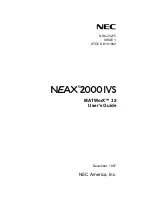
54
ExtremeWare 7.2e Installation and User Guide
Managing the Switch
Use the
none
option to remove a previously configured access-profile.
• Community strings
—The community strings allow a simple method of authentication between the
switch and the remote Network Manager. There are two types of community strings on the switch.
Read community strings provide read-only access to the switch. The default read-only community
string is public. Read-write community strings provide read and write access to the switch. The
default read-write community string is private.
• System contact
(optional)—The system contact is a text field that enables you to enter the name of
the person(s) responsible for managing the switch.
• System name
—The system name is the name that you have assigned to this switch. The default
name is the model name of the switch (for example, Summit1 switch).
• System location
(optional)—Using the system location field, you can enter an optional location for
this switch.
• Enabling/disabling link up and link down traps
(optional)—By default, link up and link down
traps (also called port-up-down traps) are enabled on the switch for all ports. SNMPv1 traps for link
up and link down are not supported; ExtremeWare uses SNMPv2 traps.
You can disable or re-enable the sending of these traps on a per port basis, by using the following
commands:
disable snmp traps port-up-down ports [all | mgmt | <portlist>]
enable snmp traps {port-up-down ports [all | mgmt | <portlist>]}
The mgmt option will only appear on platforms having a management port.
Displaying SNMP Settings
To display the SNMP settings configured on the switch, use the following command:
show management
This command displays the following information:
•
Enable/disable state for Telnet, SSH2, SNMP, and web access, along with access profile information
•
SNMP community strings
•
Authorized SNMP station list
•
SNMP MAC-security traps
•
Link up/ link down traps enabled on ports
•
SNMP trap receiver list
•
SNMP trap groups
•
RMON polling configuration
•
Login statistics
•
Enable/disable status of link up and link down traps
•
Enable/disable status of MAC-security traps
SNMP Trap Groups
SNMP trap groups allow you to specify which SNMP traps to send to a particular trap receiver. This
functionality was made possible by the underlying support for SNMPv3. Essentially, a number of
predefined filters are associated with a trap receiver, so that only those traps are sent. If you have
Summary of Contents for ExtremeWare 7.2e
Page 14: ...14 ExtremeWare 7 2 0 Software User Guide Contents...
Page 18: ...18 ExtremeWare 7 2e Installation and User Guide Preface...
Page 80: ...80 ExtremeWare 7 2e Installation and User Guide Accessing the Switch...
Page 102: ...102 ExtremeWare 7 2e Installation and User Guide Virtual LANs VLANs...
Page 108: ...108 ExtremeWare 7 2e Installation and User Guide Forwarding Database FDB...
Page 180: ...180 ExtremeWare 7 2e Installation and User Guide Security...
Page 194: ...194 ExtremeWare 7 2e Installation and User Guide Ethernet Automatic Protection Switching...
Page 218: ...218 ExtremeWare 7 2e Installation and User Guide Spanning Tree Protocol STP...
Page 248: ...248 ExtremeWare 7 2e Installation and User Guide Interior Gateway Protocols...
Page 256: ...256 ExtremeWare 7 2e Installation and User Guide IP Multicast Routing...
Page 308: ...308 ExtremeWare 7 2e Installation and User Guide Using ExtremeWare Vista on the Summit 400...
Page 316: ...316 ExtremeWare 7 2e Installation and User Guide Technical Specifications...
Page 324: ...324 ExtremeWare 7 2e Installation and User Guide Software Upgrade and Boot Options...
















































